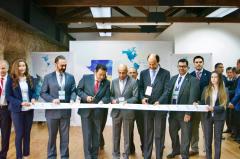Dr. Mohammed Al Zarooni, World FZO Chairman Raises Awareness On Challenges Within Technology, International Trade And Counterfeit Products At A Global Level

Jimmy Morales, President of Guatemala and His Excellency (HE) Dr. Mohammed Al Zarooni, president of the World Free Zones Organization, (World FZO) opened up proceedings for the annual Association of Free Trade Zones of the Americas (AZFA) conference held in Antigua, Guatemala.
HE Dr. Al Zarooni addressed high level delegations and attendees on the impact of new trends and challenges that are facing the industry globally, and showcased new initiatives and how they are contributing positively to the international free zone sector.
HE Dr. Al Zarooni focused on the initiatives that are helping to create wealth and sustain socio-economic improvements within global economies. He highlighted the IZDIHAR program, a global initiative that helps free zones create more sustainable value through operational efficiency, by adopting international best practices and improved decision making. He also demonstrated the value of the Safe Zone certification which contributes to a safer, faster and more efficient international trade and leads to greater prosperity.
These initiatives will play a key role in increasing efficiency, productivity and quality in the services that free zones provide. HE Dr. Al Zarooni explained that free zones need to increase cooperation in order to build new quality standards that will take the industry to another level.
“On a global scale, in the current complex economic situation, free zones around the world must adapt and react with agility and innovation in order to stay ahead of technological progress. This will help them to continue competing with offers from onshore companies and to contribute to the global value chain efficiently. Offering streamlined logistics solutions is the keystone of such agility. I am proud to see the growth and contribution of World FZO to the industry,” said HE Dr. Al Zarooni.
Dr. Al Zarooni also focused on the issues that are facing the industry from across all verticals. He highlighted the role that new technologies and digital solutions are playing in shaping the future of free zones. He showed why they should be adopted into operations to enable companies to trade efficiently and smartly across the world. He addressed another challenge that global free zones are encountering which is that they are often perceived as a source of counterfeit products. Dr. Al Zarooni emphasized the importance of using transparent certifications that will change perception and improve trade globally.
The World FZO Board of Directors also held a meeting at ADOZONA, Santo Domingo, Dominican Republic, where the CEO of the World FZO presented a new business plan to the board as well as reports on finance, membership, and policy committees. The business plan included the update report on the Safe Zone project, the Free Zone Outlook and the Free Zone Barometer. It was announced that several sponsors have approached the World FZO in order to finance and promote these key initiatives confirming that they are highly demanded by free zones, governments, and investors around the world.
During the meeting the Board also evaluated the results of the seven regional offices located in China, Dominican Republic, Argentina, Jordan, Morocco, Spain, and Kazakhstan, highlighting the organization’s global presence in over 171 countries and territories. This initiative was presented and launched in June 2018 during the World FZO annual event. The board also approved the budget results of 2018 and the budget for 2019.
Threats of trade wars, Brexit and economic uncertainty have led to increased pressure on free zones, forcing them to present unique value propositions to their customers in order to maintain strong business relationships and reach new audiences.
The World FZO was established in order to support free zones in increasing its contributions to local, regional and international economies. The organization aims to develop strategic implementations for free zones around the world. World FZO aims to create and implement plans that that help drive the evolution and progress of the industry.


